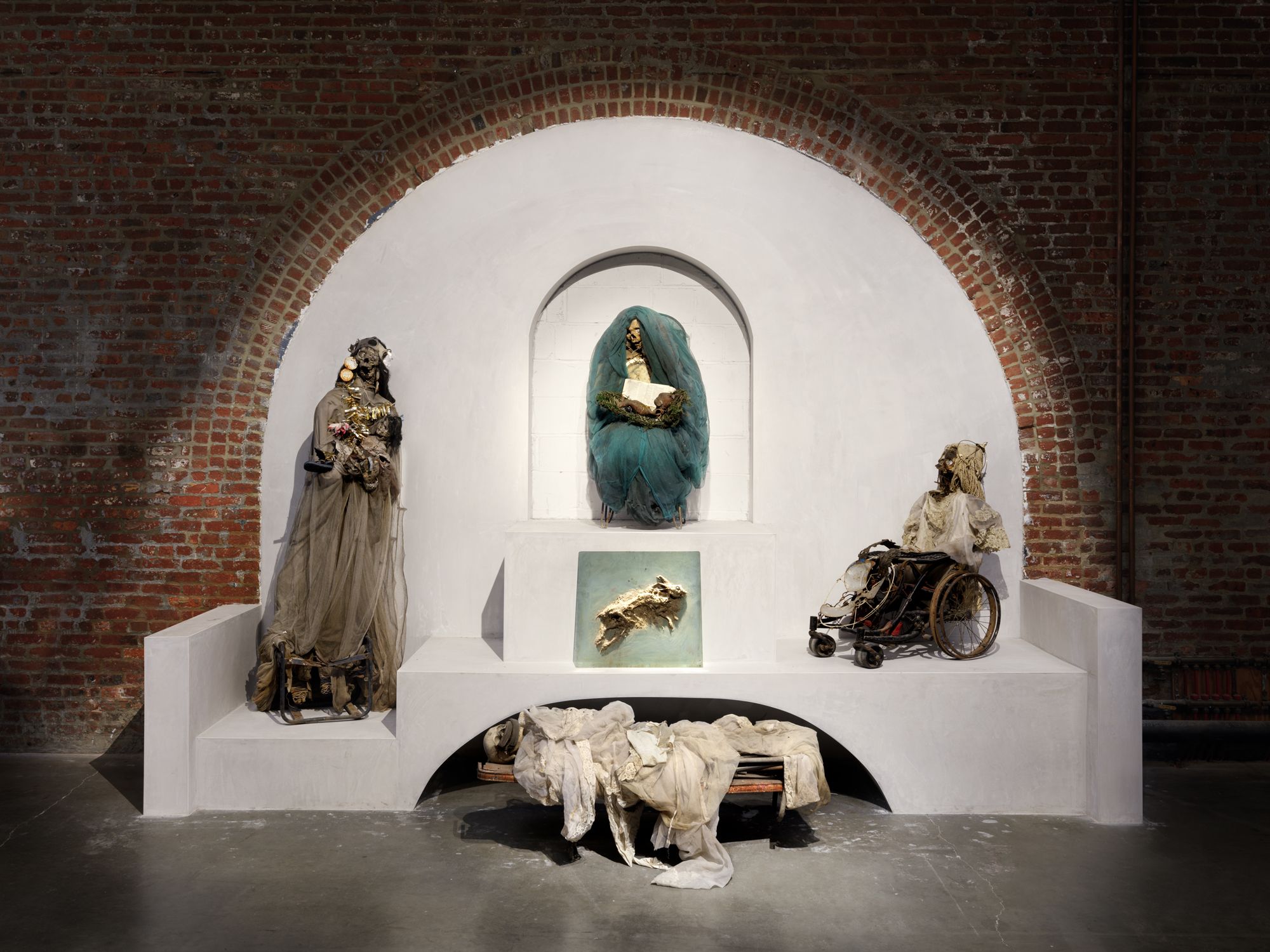
Afro-Gothic
The Afro-Gothic, as defined by scholar Kobena Mercer, is an aesthetic means of coping with the trauma of colonial slave history. Combining the African diaspora imaginary with the European literary genre, the term describes both beauty and terror, sex and violence, a “slave sublime” haunted by figures like the ghost or zombie, which has its origins in Haitian folklore. They function as “allegor[ies] of black life under colonialism,” and are particularly resonant in the context of PÒTOPRENS: The Urban Artists of Port-au-Prince. A former slave colony, Haiti established itself as the only nation-state in the world led by non-whites and former slaves after the Haitian Revolution. For the panel “Afro-Gothic,” co-curator Leah Gordon will be joined by Donald Cosentino, Jean Eddy Saint Paul, and Gina Athena Ulysse to discuss the ways in which colonial history, hauntings and Vodou, and accumulated excess and assemblage manifest as an Afro-Gothic aesthetic in Haitian contemporary art.
Donald Cosentino is Professor Emeritus of World Arts and Cultures at the University of California, Los Angeles. He served as a Peace Corps Volunteer in Nigeria (1964-66) and a community organizer in Orangeburg, South Carolina (1968-69). He received his PhD in African Languages and Literatures from the University of Wisconsin-Madison in 1976. Cosentino’s research interests include Black Atlantic art, myth, rituals, and pop cultures. He has done extensive fieldwork on oral traditions in Sierra Leone (1972-3; 1983) and Vodou art and mythology in Haiti (1986-present). He is the author of Defiant Maids and Stubborn Farmers: Tradition and Invention in Mende Story Performance (Cambridge UP, 1982, 2008) and Vodou Things: The Art of Pierrot Barra and Marie Cassaise (University of Mississippi Press, 1998). He was curator, editor, and chief writer for the award-winning project, The Sacred Arts of Haitian Vodou (1995-99) and for Divine Revolution: the Art of Edouard Duval-Carrie (2004). As a Guggenheim Fellow (2006), Cosentino completed fieldwork for Chasing the Dead, a book he is writing about his travels with an L.A. santero and his Kongo spirit guide. Cosentino is chief writer and co-curator for In Extremis: Death and Life in 21st Century Haitian Art which opened at UCLA’s Fowler Museum in September 2012 and traveled to the Musée de la Civilisation in Quebec City.
Leah Gordon’s artistic practice spans the roles of artist, curator, collector, researcher, and director. She works across a variety of media including film, photography, installation, architecture, commissioned sculpture, and painting. Gordon’s film and photographic work has been exhibited internationally at venues including the Museum of Contemporary Art, Sydney, Australia; the Dak’art Biennale, Dakar, Senegal; the National Portrait Gallery, London, UK; Parc de la Villette, Paris, France; and the NSU Art Museum, Fort Lauderdale, FL. Her photography book Kanaval: Vodou, Politics and Revolution on the Streets of Haiti was published in June 2010. She is the co-director of the Ghetto Biennale in Port-au-Prince, Haiti; was a curator for the Haitian Pavilion at the 54th Venice Biennale; was the co-curator of Kafou: Haiti, Art and Vodou at Nottingham Contemporary; was on the curatorial team for In Extremis: Death and Life in 21st-Century Haitian Art at the Fowler Museum in Los Angeles; and was the guest curator for the 2016 Outsider Art Fair in New York. In 2015, Gordon was a recipient of the 2015 Colección Patricia Phelps de Cisneros Travel Award for Central America and the Caribbean.
Jean Eddy Saint Paul is the founding director of the CUNY-wide Haitian Studies Institute and a Professor of Sociology at Brooklyn College. He earned a PhD in Sociology at El Colegio de México and has conducted theoretical and applied research in Haiti and Mexico. His ample publishing history includes books, articles, and contributions dealing with civil society; political sociology of the Haitian state and ruling class; and the intersection between politics and religion. His works have been published by international academic and commercial publishers. An accomplished scholar, Dr. Saint Paul has been a member of the National System of Scholars at the National Council of Science and Technology in Mexico. He was in residence in Paris as a Visiting Fellow at the CERI-SciencesPo. Also, he was a Visiting Scholar at the Woodson Institute for AA & AS at the University of Virginia. Currently, he is working on two book projects: Duvalierism, Rhetoric and Political Practices and Civil Society and Politics of Memory in Haiti.
Gina Athena Ulysse is a feminist artist-anthropologist-activist, or self-described Post-Zora Interventionist. An interdisciplinary scholar and methodologist, her research questions culminate at the intersections of geopolitics, historical representations, and the dailiness of Black diasporic conditions. She is the author of Why Haiti Needs New Narratives: A Post Quake Chronicle (2015), a tri-lingual publication in English, Kreyòl and French; and Because When God is too Busy: Haiti, me & THE WORLD (2017), a collection of photographs, poetry and performance texts. She was the invited editor of “Caribbean Rasanblaj” (2015), a double issue of e-misférica, and NYU’s Hemispheric Institute for Performance and Politics journal. She is currently developing a Rasanblaj Manifesto. Her creative projects include the avant-garde “VooDooDoll What if Haiti Were a Woman?: On Ti Travay Sou 21 Pwen Or An Alter(ed)native in Something Other Than Fiction”, and “Remixed Ode to Rebel’s Spirit”, a spokenword meditation. Her latest works-in-progress are “BlackLiberationMashup,” a remix of global black literatures from the 19th century to the present and a memoir Loving Haiti, Loving Vodou. She earned her PhD at the University of Michigan and is a Professor of Anthropology at Wesleyan University.